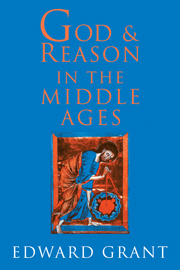Book contents
- Frontmatter
- Contents
- Acknowledgments
- Introduction
- 1 The Emergence of a Transformed Europe in the Twelfth Century
- 2 Reason Asserts Itself: The Challenge to Authority in the Early Middle Ages to 1200
- 3 Reason Takes Hold: Aristotle and the Mediveal University
- 4 Reason in Action: Logic in the Faculty of Arts
- 5 Reason in Action: Natural Philosophy in the Faculty of Arts
- 6 Reason in Action: Theology in the Faculty of Theology
- 7 The Assault on the Middle Ages
- Conclusion: The Culture and Spirit of “Poking Around”
- Bibliography
- Index
Conclusion: The Culture and Spirit of “Poking Around”
Published online by Cambridge University Press: 28 August 2009
- Frontmatter
- Contents
- Acknowledgments
- Introduction
- 1 The Emergence of a Transformed Europe in the Twelfth Century
- 2 Reason Asserts Itself: The Challenge to Authority in the Early Middle Ages to 1200
- 3 Reason Takes Hold: Aristotle and the Mediveal University
- 4 Reason in Action: Logic in the Faculty of Arts
- 5 Reason in Action: Natural Philosophy in the Faculty of Arts
- 6 Reason in Action: Theology in the Faculty of Theology
- 7 The Assault on the Middle Ages
- Conclusion: The Culture and Spirit of “Poking Around”
- Bibliography
- Index
Summary
WHAT MADE IT POSSIBLE FOR WESTERN CIVILIZATION TO develop science and the social sciences in a way that no other civilization had ever done before? The answer, I am convinced, lies in a pervasive and deep-seated spirit of inquiry that was a natural consequence of the emphasis on reason that began in the Middle Ages. With the exception of revealed truths, reason was enthroned in medieval universities as the ultimate arbiter for most intellectual arguments and controversies. It was quite natural for scholars immersed in a university environment to employ reason to probe into subject areas that had not been explored before, as well as to discuss possibilities that had not previously been seriously entertained.
Reason and the spirit of inquiry appear to be natural companions. This spirit of inquiry can be aptly described as the spirit of “poking around,” a spirit that manifests itself through an urge to apply reason to almost every kind of question and problem that confronts scholars of any particular period. Indeed, a vital aspect of “poking around” involves an irresistible urge to raise new questions, which eventually give rise to even more questions. I regard the spirit of poking around as nothing less than the spirit of scientific inquiry.
When scholars in the eleventh and twelfth centuries began the process of opposing reason to authority, they also began what may be appropriately called “the culture of poking around,” or the irrepressible urge to probe into many things.
- Type
- Chapter
- Information
- God and Reason in the Middle Ages , pp. 356 - 364Publisher: Cambridge University PressPrint publication year: 2001



